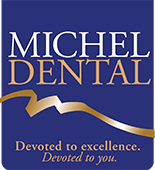Spring has sprung and thoughts turn to love. If you’d love to enhance your smile, then Dr. Michael Michel at Michel Dental in Topeka, KS, has the right cosmetic dentistry treatment for you. With porcelain veneers, Dr. Michel can correct the flaws in your smile and give you one to fall in love with.
If you tend to cover your mouth every time you smile or laugh, then you should really consider permanently covering your smile with porcelain veneers. Made of thin layers of dental porcelain, veneers are adhesively bonded to the front side of the teeth in your smile zone. They can correct a number of smile imperfections, including:
- Teeth with chips
- Teeth that are slightly cracked
- Somewhat misaligned teeth
- Stained or discolored teeth that have not responded to whitening
- Teeth with gaps in between them
- Uneven teeth
- Teeth that are unusually worn
The Porcelain Veneer Process
Once Dr. Michel determines that you are a good candidate for porcelain veneers, then you are probably only two appointments away from having a smile that is certain to put a spring in your step. At your first visit, you and Dr. Michel will discuss your smile goals while always keeping in mind that you want your veneers to be appropriate for your mouth, your face and even your complexion. A treatment plan will be devised, so you can see what your smile will look like when your veneers are placed.
Then, Dr. Michel will prepare your teeth and take a molded impression, which is sent to our reliable dental lab. While your permanent veneers are being fabricated, you’ll wear temporaries to protect your teeth. When your custom veneers arrive, you’ll return to our office for Dr. Michel to cement them on to your teeth. Each will be trimmed and polished as needed for a perfect fit.
Schedule an Appointment Today
To learn more about how porcelain veneers can enhance your smile, call Michel Dental. We serve adults and children in Topeka, KS, as well as from the surrounding areas of Emporia, Lawrence and Manhattan.
